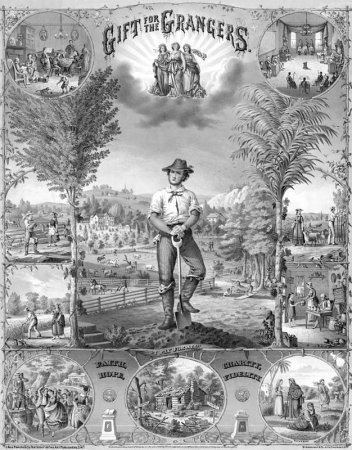Granger movement
The Event: Farmers’ movement centered on a set of advocacy clubs known collectively as the Grange
Date: 1867-early 1870’s
Place: Midwest
Significance: The Granger movement worked to improve economic conditions for farmers, lobbying for the creation of railroad and warehouse commissions in several midwestern states. Although Supreme Court decisions later undercut the commissions’ power, the movement helped pave the way for the passage of the Interstate Commerce Act in 1887.
Originally founded in 1867 by Oliver Hudson Kelley and six others as a fraternal organization for farmers, the National Grange of the Patrons of Husbandry (also known as the Grange) began to engage in political action during the early 1870’s. The years immediately following the U.S. Civil War were difficult ones for U.S. farmers, especially in the Midwest. A combination of falling grain prices and high, often discriminatory, rates charged by railroads, grain elevators, and warehouses brought many farmers to the brink of financial ruin. To combat the powerful economic institutions they felt were arrayed against them, members of the Grange and other farmorganizations lobbied for the states to regulate them.
The pre-Civil War era had already seen some successful state regulation—as early as 1831 in New York State, for example. The Granger movement brought about far more comprehensive efforts, beginning in Illinois in 1871. In that year, Illinois passed a law establishing a railroad and warehouse commission to regulate rates. Further legislation in 1873 strengthened this regulatory process. The following year, three additional midwestern states—Iowa, Minnesota, andWisconsin—established similar commissions. These laws came to be known collectively as “Granger laws,” although the Grange itself was only a part of the process that led to their enactment.
In 1877, the constitutionality of the Granger laws was upheld in the U.S. SupremeCourt decision Munn v. Illinois. Nine years later, however, the decision was reversed inWabash, St. Louis and Pacific Railway Co. v. Illinois. This defeat of state regulation contributed to the passage by Congress of the Interstate Commerce Act in 1887, which set the stage for the federal regulation of railroads during the early twentieth century.
Apromotional print from about 1873 for Grange members showing scenes of farming and farm life. (Library of Congress)
The political influence of the Grange, which had peaked in the first half of the 1870’s, diminished as the decade progressed, and the organization was superseded during the 1880’s by the various regional organizations composing the farmers’ alliance movement. In addition to its role in the passage of the “Granger laws,” the Grange during the early 1870’s inspired a wide range of cooperative enterprises, including cooperatively owned grain elevators, warehouses, retail stores, and banks that provided assistance to farmers. The majority of these, however, did not survive the decade.
Scott Wright
Further Reading
Carstensen, Vernon, ed. Farmer Discontent, 1865- 1900. New York: John Wiley & Sons, 1974.
Miller, George H. Railroads and the Granger Laws. Madison: University of Wisconsin Press, 1971.
Rugh, Susan Sessions. Our Common Country: Family Farming, Culture, and Community in the Nineteenth- Century Midwest. Bloomington: Indiana University Press, 2001.
See also: agriculture; farm labor; Farm protests; Panic of 1873; Railroads; Supreme Court and commerce.


